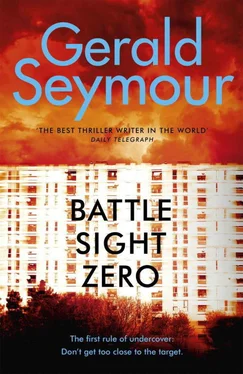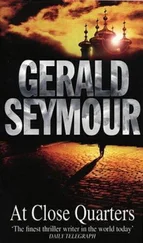She queued, bought a ticket. Wondered where he was, and wondered whether she should have boasted to them about her control of Andy Knight – where he was, sweet boy and stupid and loving – but realised she had developed a growing degree of softness for the boy – and spat from her mind talk of suspicion and acting and necessity… Zeinab waited on the platform for the next train south, and the start. Did not know where it would take her, how far beyond anything in her experience.
The first light of the day peeped over the rim of the hillside above La Castellane, and feeble shadows were thrown from the blocks and settled on the ground where the rubbish bins had not been emptied and the trees were snapped off and bushes collected garbage and plastic. Few had work that necessitated them rising early to take the 25 bus down the hill and past the old suburbs and the ferry port and into the city of Marseille. Karym’s sister was among the few. She would leave the project, cross the road, climb the rough ground and go into the shopping mall across the valley via its empty car park. She said to him that she hated the ‘fucking place, everything about it’, and he had turned his back on her, then followed her out.
It was Karym’s home.
Had once been his father’s home until he had packed one suitcase, gone with a promise of sending back money, a lie, and returned to Tunisia. Once was his mother’s but she now lived down the coast and worked there and said her children were scum. Was still the nominal home of Karym’s brother, except that Hamid slept in another block where he had an apartment littered with the trappings of his wealth and with complicated gadgetry that he could not make to function unless Karym came, and fiddled with it. He had not slept well. He walked in the alleyways between the buildings, alone. Was disturbed, and fidgeted and scratched his head.
Two sounds had lingered in his mind, neither good or easily dispersed. The mother of the boy had come out on to her balcony, had cried to the moon, to the stars and to the gulls, had made the sound of an animal in pain, and the cry was piercing. A true lament, that seemed to rip at the very heart of her intestines, as if a part of her soul burned. There was a dog that had been hit by a car on the Boulevard Henri Barnier, both legs broken, and it had screamed, and no one could get close to it with a club or an iron bar, and it had been shot with an AK which had released it from its pain, and had also allowed a degree of quiet to settle over La Castellane which made traders happier. Her son had screamed, that was the other sound that had knifed into Karym. The kid had reason to scream; the gag had worked loose and the gasoline would have been in his nostrils and the flaming rag had come close to the open window, then been tossed inside. He had screamed even after the crowd had lost sight of him behind the flames, had screamed until the tank – more fumes than fuel – had exploded and his efforts to kick his way out were curtailed. Two sounds, mother and son, both sharp. It was always that way, cries and screams, each time there was a barbecue in La Castellane. Sometimes Karym thought himself indifferent to the noises, a few times he shrugged them off: it was rare that they slashed at him, as they had that night. He had not been close to the car but it had seemed that the smoke of the burning tyres, and the flesh, had come to rest on his clothing, impregnated it. The smell was worse than the crying or the screaming. He walked in the estate. He would have been observed though he saw nobody except isolated workers hurrying to the project’s exits, escaping for the day with a coveted reward of poor wages.
The flames had long died. Wisps of smoke climbed above the scorched car. He went near enough to see the shape of the boy, but could not distinguish the head or the arms or the torso. The barbecue was part of the life of the project, so Karym neither supported it nor criticised it. The barbecue happened, and nothing would stop it, not the noise and not the smell. A new sound intruded. Sirens came from down the hill.
The day was not yet advanced, and the lights of the convoy showed up well. That the police would come, with the fire team, and in force, was built into the schedule his brother had set. They would come to a halt short of the entrance to the project, would then take a coffee and a sandwich or a piece of pie, and they would have announced their intention and then would come in when they were expected. That way, as the choreography played out, there would be no aggravation and the weapons would be left in the safe houses. It was good, Karym thought, to have understandings in place. He turned away from the burned car. No one would talk: in the newspaper, La Provence , they called it a wall of silence. No tongues would murmur in the ears of investigators. His brother was safe, Karym was certain. He saw a girl running, late for her bus, and he smiled at her, good-looking bitch and good hips, and she broke her stride to spit in the mud, then went on running. He was the brother of Hamid. He had protection but was without a friend. The police, now forming up at the side of the road, would come in force into the project and would hope to find an idiot or a lunatic or some person of any age with a death wish who would describe the barbecue and tell the name of the organiser; would find no one. Not even the mother…
In the world of Karym, in La Castellane, no one spoke to the police, gave them evidence. It would be a crime on the scale of blasphemy.
He went back to the apartment. It was his turn to clean it. Why should he be bothered? He would lie on his unmade bed, and would look at his books, study the Avtomat Kalashnikova obraztsa 1947 goda , although he could almost recite by heart, would wait for the day when, in spite of the weakness of his arm, he was allowed to hold one, fire it, blast with it, turn the selector to automatic and loose off a full magazine over a range fit for Battle Sight Zero, close up, and smell the cordite and hear the crash of the firing and the tinkling landing of ejected cartridges…
A policeman shouted at him, told him to come closer. He kept on walking.
The Major insisted that the forensic team came with him.
There was an ambulance, unnecessary for the carbonised corpse, close to the burned vehicle, and a plain-sided dark van, and all those who went close wore plastic overshoes as if the chance of preserving evidence was necessary, and had heavy gloves, and masks over their mouths and noses to counter the smell. Samson watched the mass of identical windows, and the flat roofs, and the corners of the walkways through the magnification of his rifle sight, and he had slept well before being called out and was wary. It was sensible to bring the ambulance. It might be that one of them – uniformed, a plain-clothes investigator, the doctor, the prosecutor, a photographer, an imam – would be hit if a kid fired off an assault rifle.
The police presence was now monitored by a network of calls between PayAsYouGo phones and by coded texts, and by the signs of moving hands, fingers at high windows. Samson wore his balaclava, would have been a marked man. He held his rifle ready but did not strike a pose that threatened. A woman, middle-aged and swathed in black clothing, worn loose, had approached and spoken briefly to an officer, had not been permitted near the car, had been questioned and had shaken her head vigorously, then had turned away, had gone. He thought of himself, here, as an intruder… the project, this one and all of the others in the half crescent on the north side of Marseille, lived in a differing authority and culture to the rest of the city. Own codes of conduct, own ‘judiciary’, own penalties for those who broke the singular rules of behaviour. There were many at L’Évêché, who gathered in the corridors of the city’s police headquarters and railed against the lack of a big stick to bring the traders into the orbit of the courts… But Samson remained relaxed at the divisions of the society. He was no crusader, had no great desire to find targets, zero on them, squeeze the trigger stick of his rifle: when he did he felt no remorse, no pain, was any other man who had finished a shift of his day-job. He assumed he was watched, recognised by the balaclava, and that half a dozen Kalashnikovs were aimed in the general direction of the forensics. The police would not linger. The photographs would be taken, the remnant of the blackened body would be gingerly removed, a school teacher or a social worker would come forward and condemn the barbarism of the perpetrators. The Major was at his side.
Читать дальше












